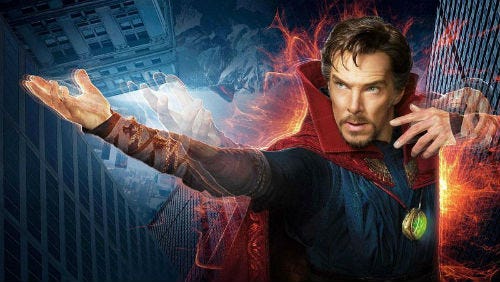Doctor Strange
“Doctor Strange” harkens back to the early days of the Marvel Cinematic Universe experiment, when the films had great characters and interesting settings but not necessarily great stories. But it's easily better than most of the movies released before “The Avengers,” and like many of the more recent films actively progresses the tone, style and depth of the franchise.
Director Scott Derrickson delivers a psychedelic adventure with a very genuine spiritual element, a movie that in some ways works as a purposeful subversion of the original “Iron Man.” I won't say “Strange” is as well-paced, edited, or emotionally compelling as some of its brethren, but I can say with confidence it's one of the most interesting movies Marvel has made thus far.

Stephen Strange (Benedict Cumberbatch) is a star neurosurgeon as arrogant as he is brilliant. His greatest assets are his nimble hands, which allow him to perform life-saving surgeries. Of course he's a sardonic dickhead, but the kind who isn't actually funny – unless you work for him. His only friend is Christine Palmer (Rachel McAdams), a fellow doctor and former lover. Strange's life changes when a texting-and-driving accident breaks his hands all to hell. He bankrupts himself trying to find a cure and ends up traveling to India and Nepal, where he joins a sorcerer commune and learns the Mystic Arts.
It's worth jumping in at the top and mentioning that the comparisons to Tony Stark are pretty obvious. Arrogant rich white guy becomes a superhero after a traumatic event? Absolutely. I've seen many complaints that “Strange” is just another “rich white guy learning to save the world,” and that's true, too. However, it does a disservice to Derrickson, co-writers Jon Spaihts and C. Robert Cargill, producer Kevin Feige and everybody involved to pretend like they aren't aware of that fact – to act like they did nothing within the movie to ameliorate that fact narratively, if not visually.
That's not to say their workarounds are perfect, which they aren't. But their efforts still make for a good movie and point toward a continually more progressive direction for the Marvel universe.
While similar to “Iron Man,” “Doctor Strange” takes the arrogant-man archetype and flips its adherent tropes on their head. He doesn't get the girl. He doesn't become the master of the foreign world into which he ventures (far from it). He doesn't find blanket forgiveness for his past misdeeds. Most importantly, Strange's journey is one of spiritual self-enlightenment rather than one of material victory.
It's the first Marvel movie to handle the act of killing as a life-changing trauma; it's also the first to feature two characters discussing matters of the soul in truly heartfelt fashion. None of these are easy themes to explore in a movie about action-hero sorcerers who harness energy from alternate universes to make weapons and shields, but hey — Derrickson manages it, and it is by far the most significant achievement in the film.
He's helped by the presence of an absurdly stacked cast. Without Cumberbatch, Strange would be much lesser. While I'm not a massive fan of him in most films, he's perfect here, both emotionally and physically. Tilda Swinton appears as the Ancient One, Strange's magician mentor. Chiwetel Ejiofor plays Mordo, Strange's partner and tutor. Benedict Wong plays Wong, one of the more powerful sorcerers in Strange's school. Lastly, Mads Mikkelsen plays Kaecilius, the movie's villain. Each actor brings their everything. It may be the most well-cast movie in Marvel's canon, and that's saying a lot.
Michael Giacchino's score is also the first Marvel soundtrack to feel distinct and of itself. One of the major problems with the franchise is that most of the characters lack iconic themes — which, to be honest, I can't say is exactly rectified here. But at the very least, the music fits squarely with the movie, and it augments the experience rather than simply supplementing it.
“Doctor Strange” is far from perfect. The action scenes are electric and the visuals amazing, but the pacing of the movie feels a bit too over-stuffed ... with reason. There's a lot to introduce, with less time or characters through which to do so. “Guardians of the Galaxy” created an entire sub-universe within the franchise and, with any luck, future “Strange” installments will, too. But “Strange” has one character with a substantial journey (with a great supporting cast), but somehow seems a lot busier than “Guardians” did. It drags in some spots, and some characters develop in ways that feel more convenient than natural.
I have never warned against a Marvel movie, and I'm not going to start now. Compared to the rest of this year's blockbusters it is only surpassed by “Captain America: Civil War” and “Deadpool,” and it offers pleasures not found in those movies. Its oddly downplayed tone is a welcome respite from the "blow it all up" nature of superhero stories, and its attempt at bringing real depth to its themes and characters makes it more thought-provoking than previous entries. You might not leave the theater thinking it's "OMG Greatest Marvel Movie Ever!" but you will leave having spent your time wisely at the flickershow.


